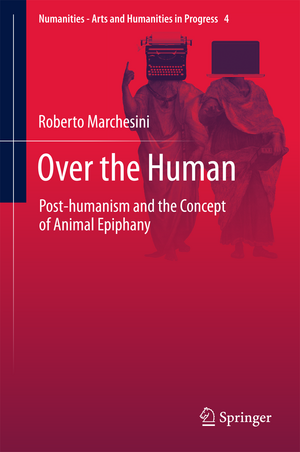Over the Human: Post-humanism and the Concept of Animal Epiphany: Numanities - Arts and Humanities in Progress, cartea 4
Autor Roberto Marchesinien Limba Engleză Hardback – 2 aug 2017
This book presents a new way to understand human–animal interactions. Offering a profound discussion of topics such as human identity, our relationship with animals and the environment, and our culture, the author channels the vibrant Italian traditions of humanism, materialism, and speculative philosophy.
The research presents a dialogue between the humanities and the natural sciences. It challenges the separation and oppression of animals with a post-humanism steeped in the traditions of the Italian Renaissance.
Readers discover a vision of the human as a species informed by an intertwining with animals. The human being is not constructed by an onto-poetic process, but rather by close relations w
ith otherness. The human system is increasingly unstable and, therefore, more hybrid.The argument it presents interests scholars, thinkers, and researchers. It also appeals to anyone who wants to delve intothe deep animal–human bond and its philosophical, cultural, political instances.
The author is a veterinarian, ethologist, and philosopher. He uses cognitive science, zooanthropology, and philosophy to engage in a series of empirical, theoretical, and practice-based engagements with animal life. In the process, he argues that animals are key to human identity and culture at all levels.
| Toate formatele și edițiile | Preț | Express |
|---|---|---|
| Paperback (1) | 521.26 lei 6-8 săpt. | |
| Springer International Publishing – 12 mai 2018 | 521.26 lei 6-8 săpt. | |
| Hardback (1) | 527.32 lei 6-8 săpt. | |
| Springer International Publishing – 2 aug 2017 | 527.32 lei 6-8 săpt. |
Din seria Numanities - Arts and Humanities in Progress
- 18%
 Preț: 729.53 lei
Preț: 729.53 lei - 18%
 Preț: 941.82 lei
Preț: 941.82 lei - 24%
 Preț: 580.92 lei
Preț: 580.92 lei - 15%
 Preț: 651.84 lei
Preț: 651.84 lei - 15%
 Preț: 640.55 lei
Preț: 640.55 lei -
 Preț: 414.66 lei
Preț: 414.66 lei -
 Preț: 393.90 lei
Preț: 393.90 lei -
 Preț: 378.12 lei
Preț: 378.12 lei - 15%
 Preț: 636.80 lei
Preț: 636.80 lei - 20%
 Preț: 559.86 lei
Preț: 559.86 lei -
 Preț: 381.81 lei
Preț: 381.81 lei -
 Preț: 388.72 lei
Preț: 388.72 lei - 18%
 Preț: 733.15 lei
Preț: 733.15 lei - 15%
 Preț: 639.90 lei
Preț: 639.90 lei - 18%
 Preț: 725.13 lei
Preț: 725.13 lei - 18%
 Preț: 785.24 lei
Preț: 785.24 lei - 18%
 Preț: 724.94 lei
Preț: 724.94 lei - 15%
 Preț: 696.68 lei
Preț: 696.68 lei - 15%
 Preț: 638.57 lei
Preț: 638.57 lei - 15%
 Preț: 647.27 lei
Preț: 647.27 lei - 24%
 Preț: 679.08 lei
Preț: 679.08 lei -
 Preț: 420.20 lei
Preț: 420.20 lei - 18%
 Preț: 727.48 lei
Preț: 727.48 lei -
 Preț: 385.29 lei
Preț: 385.29 lei -
 Preț: 391.40 lei
Preț: 391.40 lei -
 Preț: 380.25 lei
Preț: 380.25 lei
Preț: 527.32 lei
Preț vechi: 620.38 lei
-15% Nou
Puncte Express: 791
Preț estimativ în valută:
100.90€ • 105.35$ • 83.51£
100.90€ • 105.35$ • 83.51£
Carte tipărită la comandă
Livrare economică 04-18 aprilie
Preluare comenzi: 021 569.72.76
Specificații
ISBN-13: 9783319625805
ISBN-10: 3319625802
Pagini: 160
Ilustrații: VI, 160 p.
Dimensiuni: 155 x 235 mm
Greutate: 0.41 kg
Ediția:1st ed. 2017
Editura: Springer International Publishing
Colecția Springer
Seria Numanities - Arts and Humanities in Progress
Locul publicării:Cham, Switzerland
ISBN-10: 3319625802
Pagini: 160
Ilustrații: VI, 160 p.
Dimensiuni: 155 x 235 mm
Greutate: 0.41 kg
Ediția:1st ed. 2017
Editura: Springer International Publishing
Colecția Springer
Seria Numanities - Arts and Humanities in Progress
Locul publicării:Cham, Switzerland
Cuprins
1. The Epimethean Condition.- 2. The Promethean Condition.- 3. The Therioanthrophic Being As Our Neighbour.- 4. Overcoming The Human.- 5. Zoomimesis: Embodied Epiphany.- 6. Step To A Philosophical Ethology.- 7. The Posthuman Dimension.
Textul de pe ultima copertă
This book presents a new way to understand human–animal interactions. Offering a profound discussion of topics such as human identity, our relationship with animals and the environment, and our culture, the author channels the vibrant Italian traditions of humanism, materialism, and speculative philosophy.
The research presents a dialogue between the humanities and the natural sciences. It challenges the separation and oppression of animals with a post-humanism steeped in the traditions of the Italian Renaissance.
Readers discover a vision of the human as a species informed by an intertwining with animals. The human being is not constructed by an onto-poetic process, but rather by close relati
The argument it presents interests scholars, thinkers, and researchers. It also appeals to anyone who wants todelve into the deep animal–human bond and its philosophical, cultural, political instances.
The author is a veterinarian, ethologist, and philosopher. He uses cognitive science, zooanthropology, and philosophy to engage in a series of empirical, theoretical, and practice-based engagements with animal life. In the process, he argues that animals are key to human identity and culture at all levels.
Caracteristici
Argues that animals are key to human identity and culture at all levels Written by a veterinarian, ethologist, and philosopher Presents a dialog between the humanities and the natural sciences Includes supplementary material: sn.pub/extras
